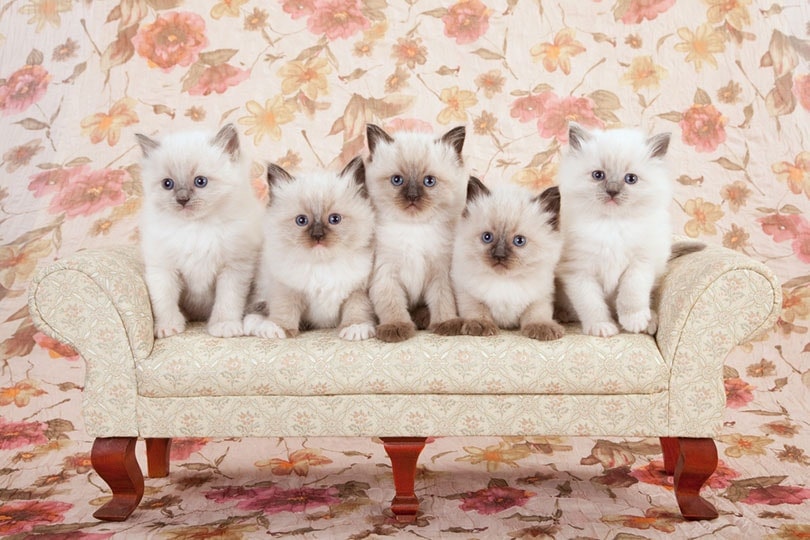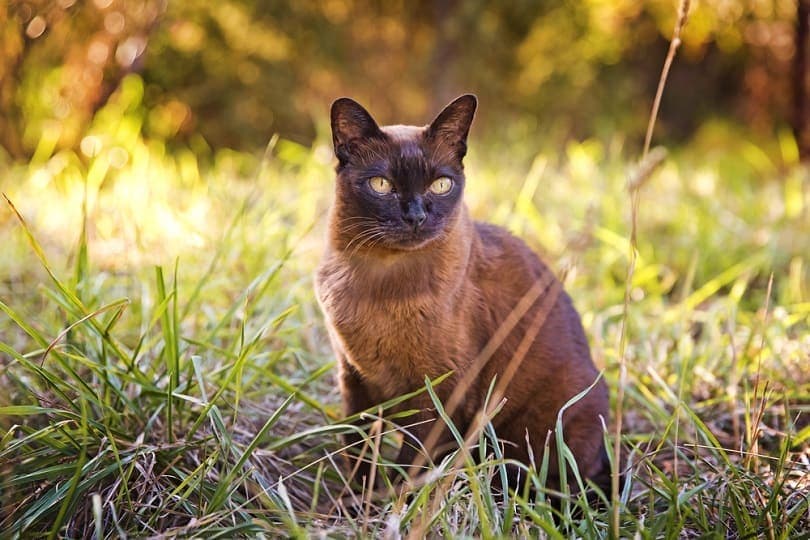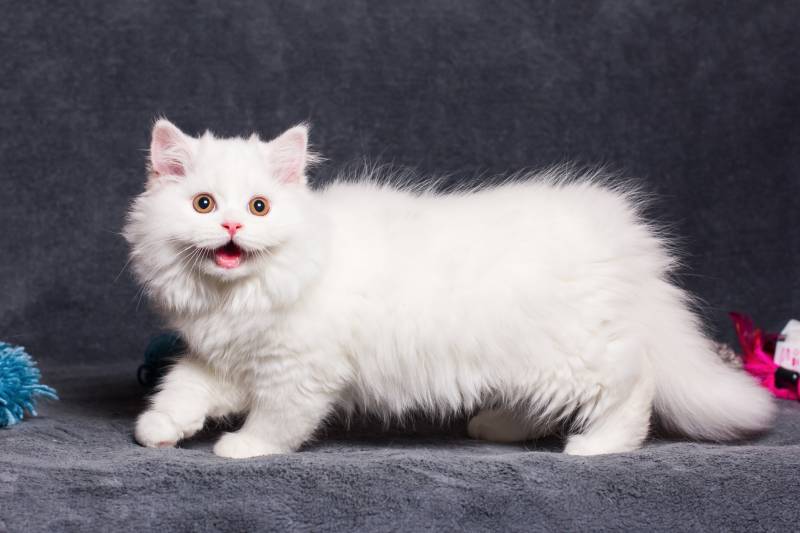Domestic Shorthair Cat: Breed Guide, Pictures, Temperament & Traits

Updated on
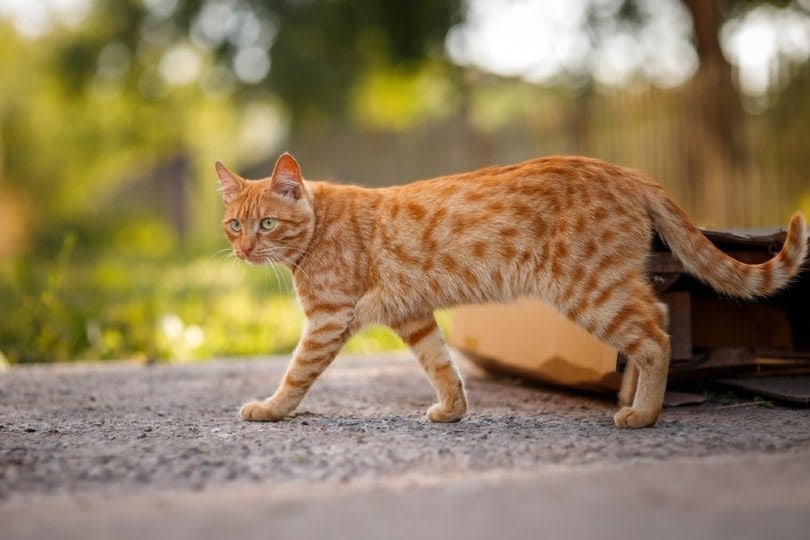
| Height: | 8-10 inches |
| Weight: | 12-15 pounds |
| Lifespan: | 15-20 years |
| Colors: | Black, brown, blue, white, orange, red, tan, silver, tabby, etc. (just about any color) |
| Suitable for: | Singles or families looking for an affordable cat |
| Temperament: | Loving, feisty, lap-cats, great for families |
Domestic Shorthair cats, sometimes called the mutts of the cat world, are some of the best pets around. Because they are a mix of many breeds, no two Domestic Shorthairs are alike. They come in a practically endless array of colors, patterns, and personalities.
Not to mention, Domestic Shorthairs are super easy to find. Just stopping by your local animal shelter will likely introduce you to your next furry friend. Plus, these cats tend to be much more interactive with people than certain pedigreed varieties.
To find out more about Domestic Shorthairs, keep reading. In this article, we tell you their history, price, temperament, and more. Chances are, you will fall in love with this adorable cat by the end—if you haven’t already!
Domestic Shorthair Kittens
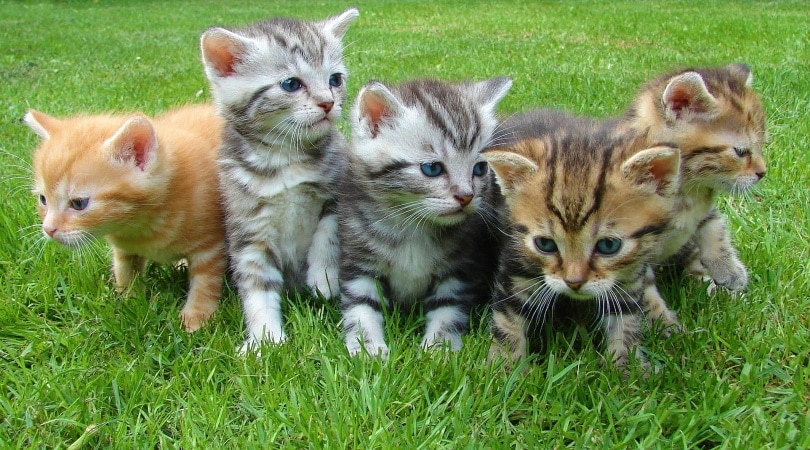
What’s the Price of Domestic Shorthair Kittens?
Domestic Shorthair kittens are some of the most affordable pets around. You can get these cats from a breeder, and you will likely only have to pay a few hundred bucks. Since this is not an official breed, they do not take a lot of skill or money to breed.
For the cheapest option, you could even go to a local adoption center and adopt one of these cats. Adoption fees can range from $15 to $200, depending on your location and the age of the cat. Most cats that are over the age of eight have adoption fees waived.
In addition to the cat itself, you will need to pay for food, kitty litter, litter box, and other basics. Luckily, you won’t have to rebuy many of the basics after bringing the cat home with you.
3 Little-Known Facts About Domestic Shorthair Cats
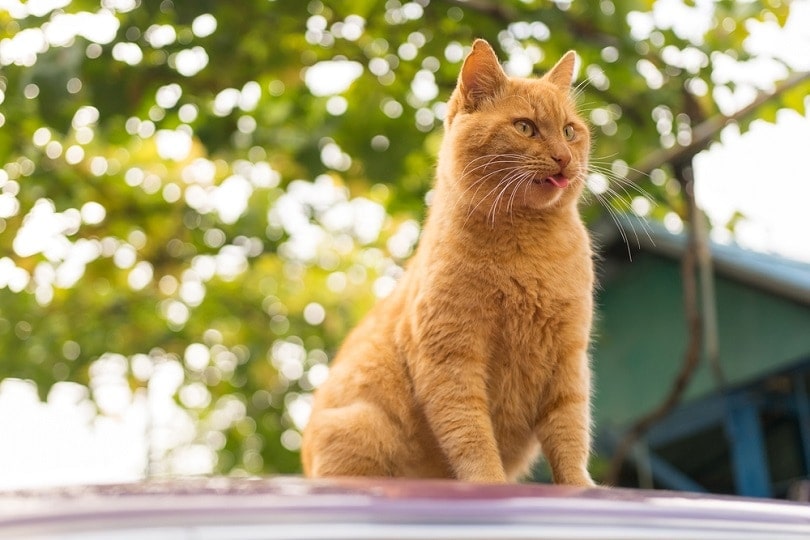
1. They Are Working Cats
Domestic Shorthair cats were once working cats. Their origin began during the early days of pioneer settling in North America. These cats became a favorite among the settlers for keeping the food storage, barns, and home free from rats and other pests.
2. Domestic Shorthairs Are Not Pedigreed Cats
Domestic Shorthairs are not a pedigreed cat, but they are accepted by the Cat Fanciers Association within the household pets category. As a result, Domestic Shorthairs can compete for the grand household pet each year. Outside of this award, Domestic Shorthairs are simply not pedigreed.
3. They Are Some of the Healthiest Cats
Domestic Shorthairs are considered some of the healthiest around. In fact, they are not predisposed to any illness or disease that we are aware of, but they are prone to overeating. Other than that, these cats are really healthy, likely because they have not been specifically bred like other breeds.
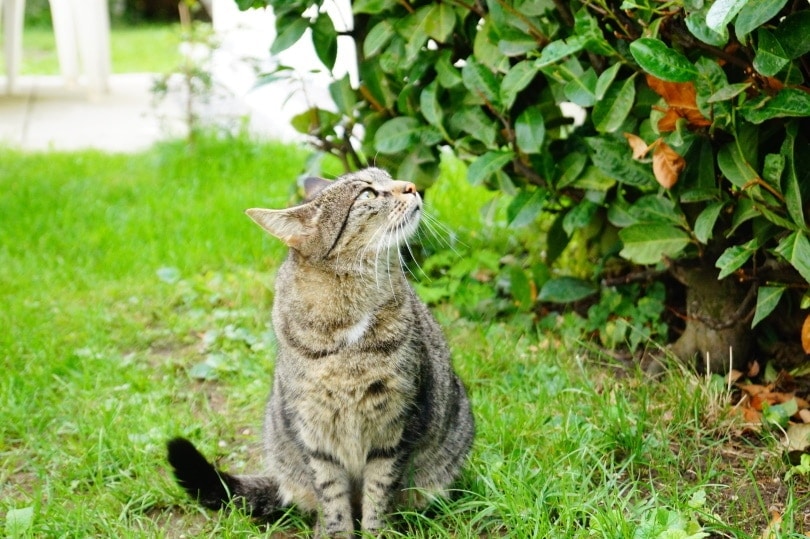
Temperament & Intelligence of the Domestic Shorthair Cat
Domestic Shorthairs are considered easygoing, lovable, and pretty adventurous cats. These are great additions to your home if you are looking for a feline friend that doesn’t cost a fortune but will bring you loads of smiles.
Are These Cats Good for Families?
Cats are not always the best pet for families since they can be a bit stressed out when around children. However, Domestic Shorthairs tend to be great for families. These cats are much more easy-going and active in comparison to other cats.
Plus, Domestic Shorthairs have been around people for most of their recent history. As a result, these cats are wonderful for families. Even if you have children, these cats should get along fine with the kids. Of course, you need to watch when your child is playing with the cat because the cat can be injured and get defensive as a result of the child.
Most of the time, though, Domestic Shorthairs will simply just walk away if they’re being pestered by the child.
Does This Breed Get Along With Other Pets?

Domestic Shorthairs are braver than many other pedigreed cat breeds. So long as the cat and other animals are socialized from an early age, the animals will probably get along great. From the cat’s perspective, you don’t have a lot to worry about. These cats likely won’t stir up much trouble with other pets.
However, you may want to be careful if you have small pets. Because these cats were used for killing mice and other small animals, they may try to pounce on birds, guinea pigs, rabbits, and other small animals that they perceive as prey. Some cats are so lazy they won’t look twice at these creatures.
Additionally, you need to be very careful if you are introducing the cat into a home with a dog. The cat will likely not have an issue with the dog, but the dog may act aggressive and injure the cat.
Things to Know When Owning a Domestic Shorthair Cat
One reason that people prefer cats over dogs is because they are relatively low maintenance. This is especially true of Domestic Shorthairs.
Food & Diet Requirements 🐡
One thing that you should be cautious about with your Domestic Shorthair is the feeding schedule. These cats will act like they’re starving at nearly all points of the day. Don’t give into their yelps for attention. Instead, only feed your cat on a consistent schedule.
We recommend feeding your Domestic Shorthair between 260 and 300 calories a day. This calorie count will keep the average adult Domestic Shorthair healthy. You may need to increase or decrease the calories depending on your cat’s age and current weight.
Something else to remember is that not all foods are created equally. Cats need a high moisture and protein content for their food. Wet cat food is ideal for meals, but you should provide high quality kibble throughout the day. .
Exercise 🐈
In terms of exercise, there is very little you need to do as a Domestic Shorthair owner to keep them active. So long as you provide toys, scratching posts, and other forms of entertainment for your cat, it will entertain and exercise itself.
You should know that the Domestic Shorthair will be the most active at night. Some people can get annoyed by their Domestic Shorthairs because they decide to start running around in the dark of the night. During the day, expect your Domestic Shorthair to sleep quite a bit.
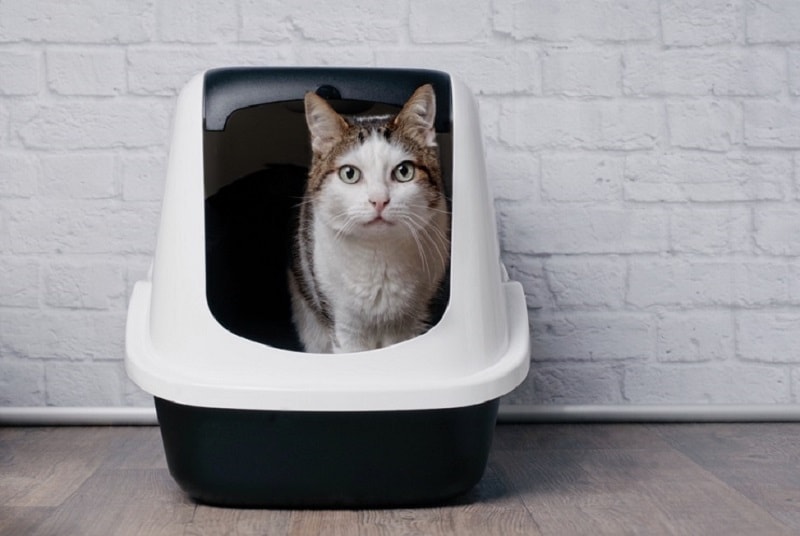
Training 🎾
Most people do not train their Domestic Shorthairs except for to find and use the litter box, which doesn’t require much skill or effort on your part. With most people, throwing the cat in the litter box once is enough for them to be trained.
If you want a cat for tricks and other more difficult training needs, the Domestic Shorthair may not be the choice for you. There are more intelligent cat breeds, but they will be much more expensive and more difficult to find than Domestic Shorthairs.
Grooming ✂️
Grooming is very easy for Domestic Shorthairs. You will likely want to brush the cat’s coat once a week, though your cat may beg for more frequent brushes because they love the feel. The more often you brush your cat, the less fur will be around your house.
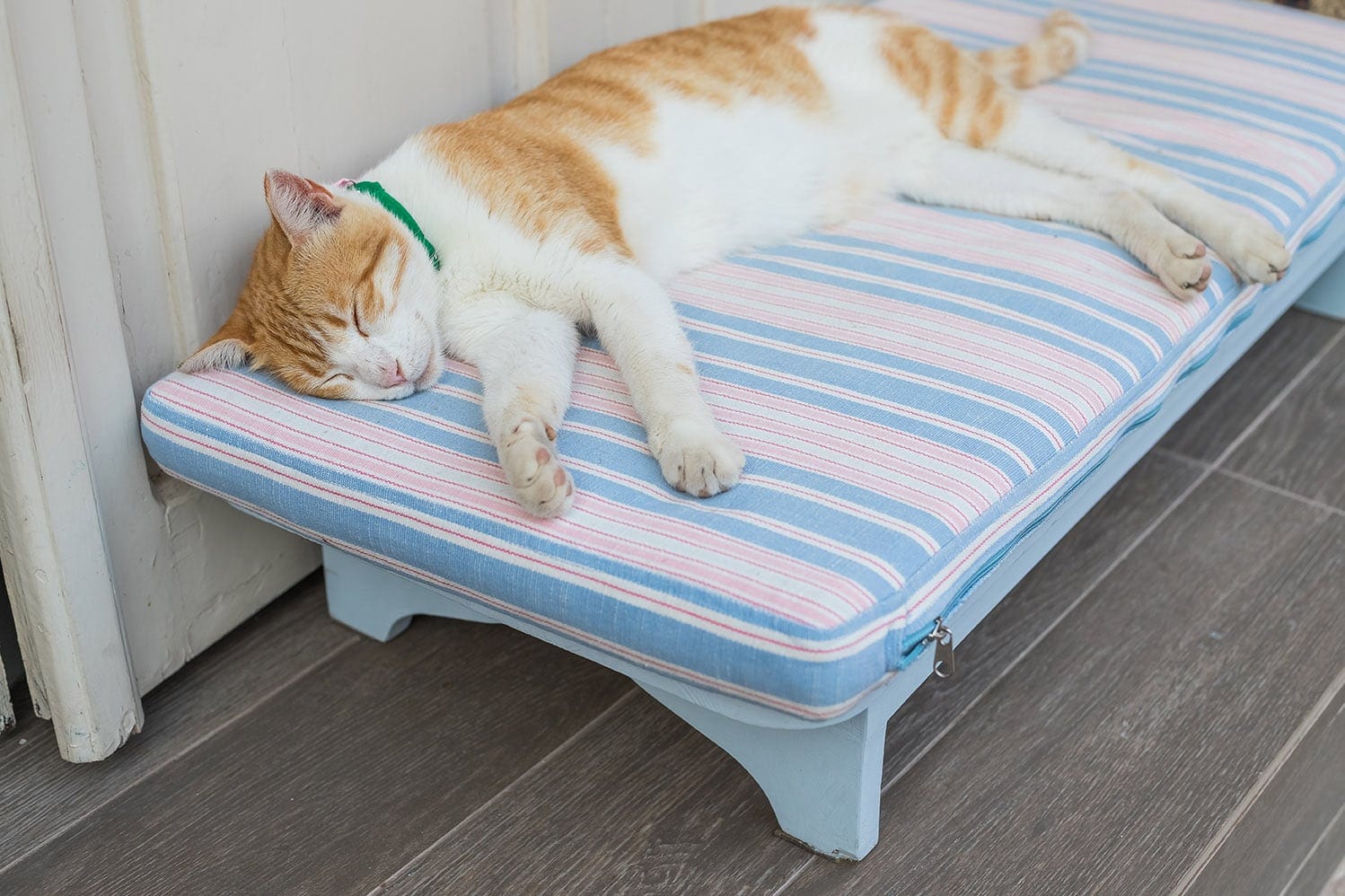
Health and Conditions 🏥
As we have already mentioned, Domestic Shorthairs are incredibly healthy. As a result, you have little to worry about in terms of health, so long as you provide the cat the right diet and exercise.
- As for minor conditions, your cat may experience ear infections, a hurt paw if it jumps off the counter, or an upset stomach. Ear infections will require a trip to the doctor, but upset stomachs and slightly injured paws will likely heal on their own.
- The most serious problem to be aware of is obesity. These cats are really lazy and love to eat. If given the opportunity, they will become massively overweight from overeating and constantly sleeping. Cats that suffer from obesity will also have joint pain, liver and kidney problems, heart disease, and more.
Male vs. Female
It is a bit difficult to predict whether or not gender will affect your Domestic Shorthair’s personality. Some people swear that male cats are better than females because they are less territorial, but many people also claim they don’t have issues with females at all.
As a whole, males are larger than the females, but their size isn’t that different. It is really up to personal preference whether or not you get a female or male cat.
Conclusion
Domestic Shorthair cats are a great addition to any family. They are affordable, cute, and love attention. The majority of cat owners actually have a Domestic Shorthair, which means you probably know one or two of these cats already.
Overall, Domestic Shorthairs are a great choice if you are looking to invite a cat into your home that won’t cost a fortune but will still love your attention. We recommend stopping by a local animal shelter to adopt a Domestic Shorthair in need. You will likely be able to find kittens and adult cats alike.
Featured Image Credit; Roman Milavin, Shutterstock
